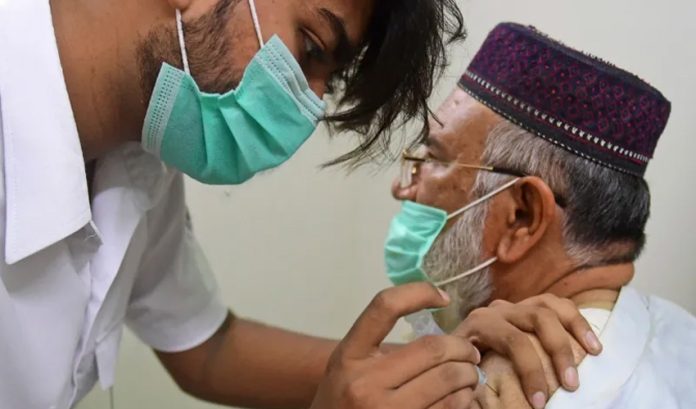National Institute of Health issues advisory for prevention, control of JN.1 sub-variant in Pakistan
SLAMABAD: Amid growing concerns over new COVID-19 variant spread, the National Command and Operation Centre (NCOC) has decided to resume mandatory testing of 2% of inbound passengers.
The testing will help detect and prevent JN.1 sub-variant of COVID-19.
However, reports regarding the unavailability of testing kits and Personal Protection Equipment (PPE) later emerged, as major airports, including Islamabad and Karachi, lacked the facilities, officials told the publication.
“On the directives of caretaker federal Health Minister Dr Nadeem Jan, surveillance at the country’s points of entry, including airports, has been increased and 2 percent mandatory testing for COVID-19 has been resumed to detect JN.1 variant of SARS-CoV-2 or coronavirus,” the NCOC official told The News on Wednesday.
Ironically, neither the COVID-19 testing kits nor the PPE were available at the many points of entry for the healthcare workers associated with Border Health Services (BHS). Officials said neither the kits nor the PPE were procured after the World Health Organisation (WHO) declared in June this year that COVID-19 was no longer a public health emergency of international concern.
Although the COVID-19 positivity remained extremely low in the country and no case of its JN.1 variant had been detected till Wednesday, the National Institute of Health (NIH) issued an advisory for the prevention and control of JN.1 sub-variant.
Quoting the World Health Organization (WHO), the NIH advisory said that JN.1 sub-variant has been classified as a Variant of Interest (VOI) and is fundamentally an offshoot of BA.2.86 sub-variant of the omicron variant of COVID-19. It was first reported in August 2023 by US-CDC.
In recent weeks, JN.1 has been reported in many countries, and its prevalence is rapidly increasing globally, the National Institutes of Health’s (NIH) advisory said, adding that this rapid growth is being observed across the three WHO regions with consistent sharing of SARS-CoV-2 sequences, i.e. the region of the Americas, the Western Pacific and the European regions, with the largest increase seen in Western Pacific from 1.1% in epidemiological week 44 to 65.6% in epidemiological week 48.
“The objective of this advisory is to alert and facilitate the health authorities and other stakeholders for ensuring timely preventive and control measures encompassing preparedness to deal with increased workload expected in the outpatient and in-patient departments during the next few weeks,” the NIH stated.
The National Institute of Health further stated that although JN.1 is rapidly replacing other sub-variants and its transmissibility is expected to be high, it is unlikely that it can produce a situation like the earlier phase of the pandemic, hence its morbidity and mortality are low as of current statistics.
“Clinical presentation of JN.1 infection is similar to other sub-variants including cough, sore throat, congestion, runny nose, sneezing, fatigue, headache, muscle aches and altered sense of smell. However, symptom presentation depends on an individual’s immunity from vaccination and previous infection. It’s important to know that existing vaccines, tests and treatments still work well against JN.1,” the advisory stated.












